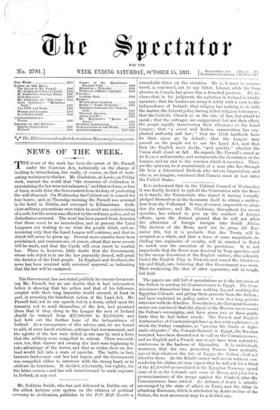The papers are still full of speculations as to the
intention of the Sultan in sending his Commissioners to Egypt. The Com- missioners themselves have done nothing beyond scolding the Egyptian Colonels and giving them presents from the Sultan ; and have explained no policy, unless it were in a long, private interview with the Khedive. Nevertheless, the European Govern- ments are convinced that the object of the Mission was to assert the Sultan's sovereignty, and have given two or three gentle hints that he had better recede. The French and English Ambassadors at Constantinople have spoken with a plainness, of which the Sultan complains, as "passing the limits of diplo- matic etiquette ;" the Consuls-General in Egypt, the Russian excepted, have been directed not to call on the Commissioners ; and an English and a French war-vessel have been ordered to rendezvous in the harbour of Alexandria. It is understood, moreover, that the two protecting Powers have mutually agreed that whatever the fate of Egypt, the Sultan shall not interfere there. As the Khalif cannot well recede without sur- rendering his claims, we may expect that he will ask for a third of the fl,500,000 accumulated in the Egyptian Treasury, spend some of it on the Colonels and some in Mecca, and plan for a, pronunciamiento of the troops against the Control, after the Commissioners have retired. As Achmet el Arabi is greatly encouraged by the state of affairs in Tunis, and the delay in attacking Kairouan, which is attributed by Arabs to fear of the Sultan, the next movement may be a decided one.


































